新概念英语教案第二册73课
2024年新概念英语NCE2_Lesson73课件
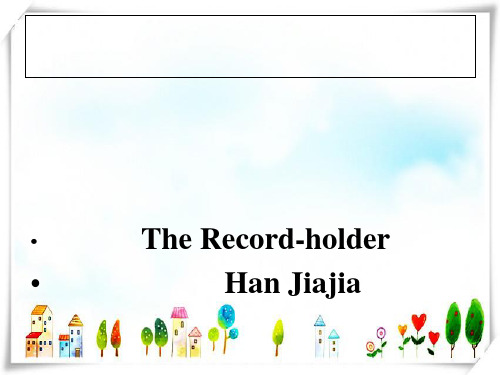
• When he woke up next morning, he discovered that the boat had, in the meantime, travelled to Calais.
• in the meantime(meanwhile) • 在此期间,与此同时
will damage his image. • 可以想象,违反婚约将损害他的形象。
• A quiet day's fishing, or eight hours in a cinema seeing the same film over and over again, is usually as far as they get.
• eg.As a boy, Tom u.
• Should the students be punished for playing truant?
• 学生逃课应该受到惩罚吗?
• unimaginative adj.毫无想象力 • imaginative adj.富于想象力的,爱想象的 • eg.He is an imaginative painter.
• eg. I feel tired and would like to take a nap. In the meantime, you may do some reading.
• 我觉得累了,想打个盹儿。在此期间,你 可以看看书。
• No one noticed the boy as he crept off.
• creep vi.爬行,匍匐,(象爬行似地)慢慢前 进
• eg.The old car crept along the country road. • 那辆旧车沿着乡间小路慢慢行使。悄悄地/蹑
新概念英语第二册Lesson73 The record-holder 课件
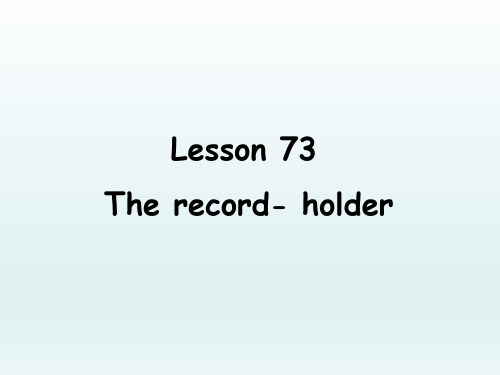
定语从句
方式状语从句
( took him )
Article focuses
He has surely set up a record for the thousands of children who dream of evading school.
5. thousands of 数以千计的 hundreds of 数以百计的 millions of 数以百万计的
___t_a_x_i h_o_m_e_.____________________________________ 5. He went to bed . Before that he had a cup of tea .(Before doing)
_B_e_f_o_r_e_g_o_in_g_t_o_b_e_d__,h_e_h_a_d__a_c_u_p_o_f_t_e_a.__
3. The weather was too cold . Water outside the room turned into ice quickly. (so …that) _T_h_e_w_e_a_t_h_e_r _is__so__co_l_d_t_h_a_t _w_a_t_er__o_ut_s_id_e__th_e__ro_o_m__t_ur_n_e_d___ _i_n_to__ic_e_q_u_ic_k_l_y.___________________________________
Exercise
一、根据句意和汉语提示用适当形式填空 1. He holds the world _r_e_c_o_rd__ for 110 metre hurdles.(记录) 2. You buy the fruits, in the _m_e_a_nt_i_m_e_ I’ll cook breakfast.(其间) 3. You ought to be put to __s_h_am__e__ by your bad behavior.(惭愧) 4. He is an _u_n_im_a_g_i_na_t_iv_e__writer.(缺乏想象力的) 5. He was trying to _e_v_a_d_e_ the issue(问题).(逃避) 6.To cross the _b_o_r_d_er_ , you will need a passport.(边 界)
新概念英语第二册73课

The application of grammar points in the text
The simple past tense is employed to narrate past events, for instance, "Yesterday, I went to the park with my friends."
Analysis of Long Sentences
Long sentence example
"The children were playing in the park when suddenly a dog came running towards them, barking loudly."
• Learners should be encouraged to generate their own examples of each grammatical structure and share them with classmates for feedback and discussion.
The text emphasizes the need for English language proficiency in today's globalized world.
Background of the text
The text assumes that the reader has a basic knowledge of English language and grammar.
Expansion and practice of grammar points
• Additional examples of each grammatical structure should be provided, allowing learners to practice and solidify their understanding.
新概念二册L73 The record-holder

2. 用倒装句来强调以加强语气
• 我从来没看过这么精彩的一场电影。 • Never have I seen such a wonderful film.
3. very, only, single修饰名词
• This is the very thing I’m after.
• You are the only person here who can help us.
• record-holder truant unimaginative shame hitchhike meantime lorry border evade
New lesson:新课讲解
纪录保持者 n. 逃学的孩子 adj. 缺乏想像力的 n. 惭愧,羞耻
v. 搭便车旅行 n. 其间 n. 卡车 n. 边界 v. 逃避,逃离
① 强调主语 • It was Tom who lost a wallet in the car park last night.
② 强调宾语 • It was a wallet that Tom lost in the car park last night.
③ 强调时间状语 • It was last night that Tom lost a wallet in the car park.
Little teacher:小先生
• welcome
Summary:课堂小结
• Ask several students to retell the dialogue in their own words.Preview the next part.
Practice:巩固练习
1. Summary writing 2. Do the exercise on the book
Lesson73Therecordholder课文详解重点词汇语法学案新概念第二册
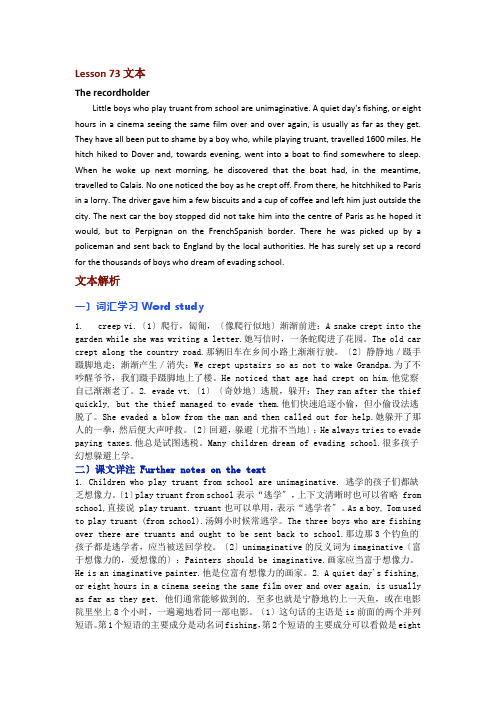
Lesson 73 文本The recordholderLittle boys who play truant from school are unimaginative. A quiet day's fishing, or eight hours in a cinema seeing the same film over and over again, is usually as far as they get. They have all been put to shame by a boy who, while playing truant, travelled 1600 miles. He hitch hiked to Dover and, towards evening, went into a boat to find somewhere to sleep. When he woke up next morning, he discovered that the boat had, in the meantime, travelled to Calais. No one noticed the boy as he crept off. From there, he hitchhiked to Paris in a lorry. The driver gave him a few biscuits and a cup of coffee and left him just outside the city. The next car the boy stopped did not take him into the centre of Paris as he hoped it would, but to Perpignan on the FrenchSpanish border. There he was picked up by a policeman and sent back to England by the local authorities. He has surely set up a record for the thousands of boys who dream of evading school.文本解析一〕词汇学习Word study1. creep vi.〔1〕爬行,匐匍,〔像爬行似地〕渐渐前进:A snake crept into the garden while she was writing a letter.她写信时,一条蛇爬进了花园。
新概念英语第二册73课课后习题详细答案教学教材

新概念英语第二册73课课后习题详细答案新概念英语第二册课后习题答案详解Lesson 73练习答案 Key to written exercises1.关键句型练习答案A who(1.1); or (1.2); as far as (1.3); who(1.4); while (1.4);and(1.5); When(1.6); as(1.8); and(1.9); and (1.9); as(1.10);but(1.10); and(1.11); wno(1.12)C 1 The climbers not only reached the top of the mountain,but(they)spent the night there as well.2 When a fire broke out in a cinema, several hundred people tried to leave the building and a number of them were injured.3 James Sullivan, whose book on the Antarctic was published recently, will give a lecture at the local library next week.4 Although the police searched everywhere, neither the missing boy nor his dog could be found.5 In spite of the fact that fares have increased, the railway company is still losing money because the employees have demanded higher wages.6 He gave me such a fright that I knocked the teapot over.7 After making sure that the alarm clock worked, I set it so that it would ring at six o'clock.8 I hid the Christmas presents under the desk quickly so that my young daughter would not see them when she entered the room9 Refusing the offer, I explained that I had already been offered a job by another company.10 He fought the wolves off for three hours before help arrived. 2.多项选择题答案1. c2. 根据课文第5行He hitchhiked to Dover (他搭便车到了多佛)可以判断只有c.Someone gave him a lift (某人让他搭便车)与课文的内容相符,并能说明他是怎么到达多佛的,其他3个选择都与课文内容无关。
新概念第二册 Lesson 73 The record-holder

hitchhike
hitch /hɪtʃ/ v. 搭便车,提起 n. 故障 hike /haɪk/ v. & n. 徒步旅行,远足 hitchhike /ˈhɪtʃhaɪk/ v. 搭便车旅行 E.g. He hitchhiked to Dover and, towards evening, went into a boat to find somewhere to sleep. 他搭便车到了丹佛,天快黑时钻进了一条船,想找个地方睡觉。
NCE 2 LESSON 73 THE RECORD-HOLDER
New words and expression
record-holder /ˈrekɔːd həʊldə(r)/ 记录 hitchhike /ˈhɪtʃhaɪk/ v. 搭便车旅行
保持者
meantime /ˈmiːntaɪm/ n. 其问
Listen & then answer the question Did the boy go where he wanted to?
TEXT
as far as they get,他们顶多到这种程度而已 ,as far as作“到......程度”解。
Children who play truant from school are unimaginative. A quiet
No one noticed the boy as he crept off. From there, he hitchhiked
to Paris in a lorry. The driver gave him a few biscuits and a cup of
coffee and left him just outside the city. The next car the boy
新概念第L73课thewaytoKingStreet教案

新概念第L73课thewaytoKingStreet教案新三L73-74电⼦教案课型指:新课、活动课或复习课授课教师授课时间班级代号NC1 授课地点课型新课课时3节课课题L73 The way to King Street 教学设计过程反思Ⅰ.Teaching content:L73, 74 words text GrammerⅡ. Teaching aims :1 L73, 74单词听说读写及单词拓展2 L73课⽂理解及读背,重点句型3 L73语法理解及掌握(⼀般过去时及动词过去式不规则变化,形容词变副词规则变化)4 完成相关练习Ⅲ.Main points:1 L73,74单词听说读写----分解拼读,接龙,快速反应拓展----出⽰句型让孩⼦理解意思,中英⽂互译,学⽣在⽼师引导下造句。
快速反应。
2 L73课⽂理解及读背--- ⼝语问答,翻译,重难点句⼦突破,造句,中英⽂记忆3 L73语法理解及掌握⼀般过去时及动词过去式不规则变化,形容词变副词规则变化句型结构:由Ss通过观察和会意,总结句型结构,并完成句型转换⼝头练习和笔头练习。
Ⅳ.Difficult points:L73语法理解及掌握⼀般过去时及动词过去式不规则变化,形容词变副词规则变化Ⅴ. Teaching aids:1 radio;2 PPT;3 不规则动词词卡Ⅵ. Teaching periods: 3 lessonsⅦ. Teaching steps:课前1. 上交作业本,互动⼿册2. 同学找⽼师背词3. 读书(⽼师批改作业)。
4. 点名The First LessonStep1 Warm up and Greeting 51Greeting (Hello. Nice to meet you. How are you? What's the weather like? What are you going to do tomorrow? Where were you yesterday? What did you do yesterday?)1)T ask SS Task 1S2)组织⽤语Hello ,boys and girls How are you? today…Step2 Review 5L71 words1 fast reaction2 SS----1S(由全班到个⼈)组织⽤语:GA and GB have a match,I say次数you saytime and spell it OKL71 Text1Ss根据中⽂背诵课⽂组织⽤语:Let’s recite the text together according to the Chinese meaning.2 role play (GA and GB 1S and 1S)L71-72 Grammar1 ⼀般过去时的结构,时标2. 动词过去式规则变化Step3 presentation 25Sentence1 lead in:Pair work(模仿timetable进⾏造句)A:What did you do yesterday?B:I played basketball yesterday.……通过复习规则变化到不规则变化的动词过去式2. practice:通过词卡带读定⾳操练3. 快速反应:看到原形说过去式(Ss—1S)4. make sentence, 由T导⼊。
新概念2_Lesson73 课件(共46张PPT)

• 搭便车去某地? • 接近傍晚? • 钻进一条船? • 睡觉的地方?
5、When he woke up next morning, he discovered that the boat had, in the meantime, travelled to Calais.
② vt.(巧妙地)逃脱,躲开 She evaded a blow from the man and then called out for help.
• Are you trying to evade something ?
• n. evasion 逃避 • tax evasion 逃税 • adj. evasive 推脱的,推诿的
我离开了家, 同时, 鼠吃了我的晚饭 I left home, in the meantime, the mouse ate
my dinner.
Lorry n.卡车 ,货运汽车 (truck)
----lorries
a lorry driver 卡车司机
border n. 边界,边儿
borderline n. 界限
but now he felt quite regretful.
• who 引导的是什么从句? • 一个短语
• who 引导的是 定语从句。 • play truant (from school ) 逃学
2、A quiet day's fishing, or eight hours in a cinema seeing the same film over and over again, is usually as far as they get.
新概念第二册第73课课文原文
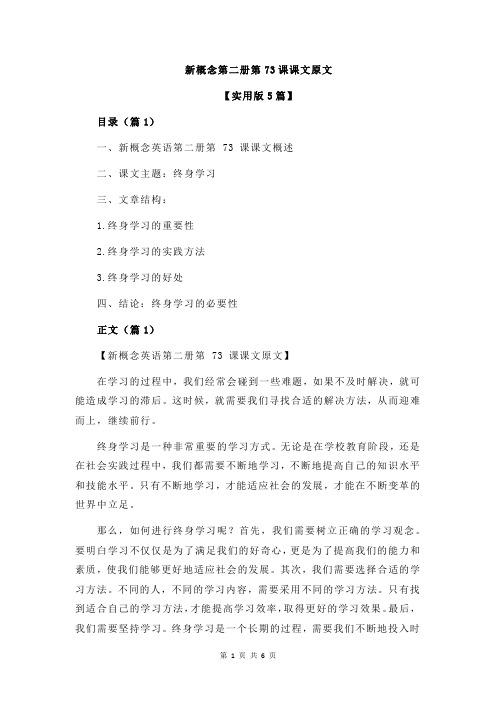
新概念第二册第73课课文原文【实用版5篇】目录(篇1)一、新概念英语第二册第 73 课课文概述二、课文主题:终身学习三、文章结构:1.终身学习的重要性2.终身学习的实践方法3.终身学习的好处四、结论:终身学习的必要性正文(篇1)【新概念英语第二册第 73 课课文原文】在学习的过程中,我们经常会碰到一些难题,如果不及时解决,就可能造成学习的滞后。
这时候,就需要我们寻找合适的解决方法,从而迎难而上,继续前行。
终身学习是一种非常重要的学习方式。
无论是在学校教育阶段,还是在社会实践过程中,我们都需要不断地学习,不断地提高自己的知识水平和技能水平。
只有不断地学习,才能适应社会的发展,才能在不断变革的世界中立足。
那么,如何进行终身学习呢?首先,我们需要树立正确的学习观念。
要明白学习不仅仅是为了满足我们的好奇心,更是为了提高我们的能力和素质,使我们能够更好地适应社会的发展。
其次,我们需要选择合适的学习方法。
不同的人,不同的学习内容,需要采用不同的学习方法。
只有找到适合自己的学习方法,才能提高学习效率,取得更好的学习效果。
最后,我们需要坚持学习。
终身学习是一个长期的过程,需要我们不断地投入时间和精力,坚持不懈地学习。
只有持之以恒,才能取得成功。
终身学习不仅能够提高我们的知识水平和技能水平,还能够增强我们的自信心,提高我们的生活质量。
在现代社会中,知识更新的速度非常快,如果我们不能不断地学习,就会被社会淘汰。
只有通过终身学习,才能够保持自己的竞争力,从而在社会中取得成功。
总之,终身学习是一种非常重要的学习方式。
只有通过终身学习,才能够提高自己的知识水平和技能水平,从而在社会中立足。
目录(篇2)一、新概念英语第二册第 73 课课文概述二、课文的主题和目的三、课文的内容和结构四、课文的语言特点和难点五、如何学习和应用课文正文(篇2)一、新概念英语第二册第 73 课课文概述新概念英语第二册第 73 课课文是一篇关于如何写一篇好文章的教程,旨在帮助学习者提高写作能力,掌握写作技巧。
新概念英语第二册:Lesson73课文注释知识讲解

新概念英语第二册:Lesson73课文注释知识讲解新概念英语第二册:L e s s o n 7 3 课文注释新概念英语第二册:Lesso n73课文注释【篇一】Childre n who play trua nt from school are uni mag in ative. 逃学的孩子们都缺乏想像力。
(1) play truant from school 表示“逃学”,上下文清楚时也能够省略from school, 直接说play trua nt. trua nt 也能够单用,表示“逃学者”。
As a boy, Tom used to play trua nt (from school).汤姆小时候常逃学。
The three boys who are fish ing over there are trua nts and ought to be sent back to school.那边那3个钓鱼的孩子都是逃学者,理应被送回学校。
(2) unimaginative 的反义词为imaginative(富于想像力的,爱想像的):Pain ters should be imag in ative.画家理应富于想像力。
He is an imag in ative pain ter.他是位富有想像力的画家。
【篇二】A quiet days fish ing, or eight hours in a cin ema see ing the same film over and over aga in, is usually as far as they get.他们通常能够做到的,至多也就是安静地钓上一天鱼,或在电影院里坐上8个小时,一遍遍地看同一部电影。
(1) 这句话的主语是is前面的两个并列短语。
第1个短语的主要成分是动名词fishing,第2个短语的主要成分能够看做是eighthours(作为一个时间总量,它后面要跟动词单数形式)。
新概念英语二讲义73-74
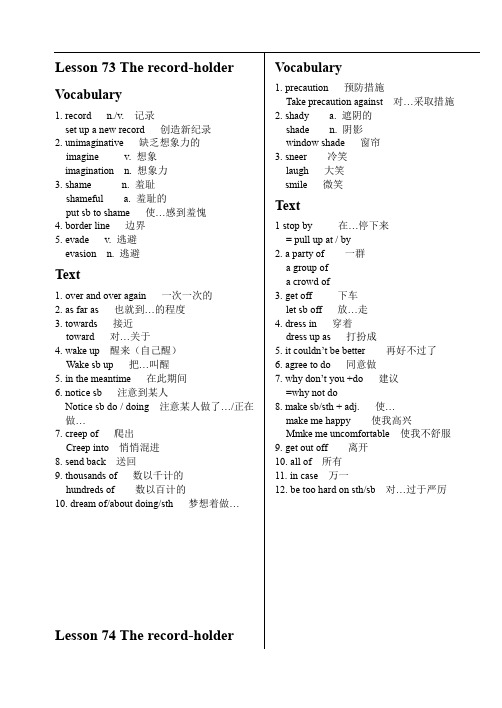
Lesson 73 The record-holder Vocabulary1. record n./v. 记录set up a new record 创造新纪录2. unimaginative 缺乏想象力的imagine v. 想象imagination n. 想象力3. shame n. 羞耻shameful a. 羞耻的put sb to shame 使…感到羞愧4. border line 边界5. evade v. 逃避evasion n. 逃避Text1. over and over again 一次一次的2. as far as 也就到…的程度3. towards 接近toward 对…关于4. wake up 醒来(自己醒)Wake sb up 把…叫醒5. in the meantime 在此期间6. notice sb 注意到某人Notice sb do / doing 注意某人做了…/正在做…7. creep of 爬出Creep into 悄悄混进8. send back 送回9. thousands of 数以千计的hundreds of 数以百计的10. dream of/about doing/sth 梦想着做…Lesson 74 The record-holder Vocabulary1. precaution 预防措施Take precaution against 对…采取措施2. shady a. 遮阴的shade n. 阴影window shade 窗帘3. sneer 冷笑laugh 大笑smile 微笑Text1 stop by 在…停下来= pull up at / by2. a party of 一群a group ofa crowd of3. get off 下车let sb off 放…走4. dress in 穿着dress up as 打扮成5. it could n’t be better 再好不过了6. agree to do 同意做7. why don’t you +do 建议=why not do8. make sb/sth + adj. 使…make me happy 使我高兴Mmke me uncomfortable 使我不舒服9. get out off 离开10. all of 所有11. in case 万一12. be too hard on sth/sb 对…过于严厉。
新概念2册第73课课件

新概念2册第73课课件Lesson 73:The record-holder 纪录保持着First listen and then answer the question.听录音,然后回答以下问题。
Did the boy go where he wanted to?Children who play truant from school are unimaginative. A quiet day's fishing, or eight hours in a cinema seeing the same film over and over again, is usually as far as they get. They have all been put to shame by a boy who, while playing truant, travelled 1,600 miles. He hitchhiked to Dover and, towards evening, went into a boat to find somewhere to sleep. When he woke up next morning, he discovered that the boat had, in the meantime, travelled to Calais. No one noticed the boy as he crept off. From there, he hitchhiked to Paris in a lorry. The driver gave him a few biscuits and a cup of coffee and left him just outside the city. The next car the boy stopped did not take him into the centre of Paris as he hoped it would, but toevade doing sth. 逃避做……He always tries to evade paying taxes.Many children dream of evading school. avoid v. 逃避,逃离,避免avoid 指通过一种合理的,正当的手段来避免做某事;evade 指通过欺骗的手段来避免做某事。
新概念英语第二册Lesson73教案
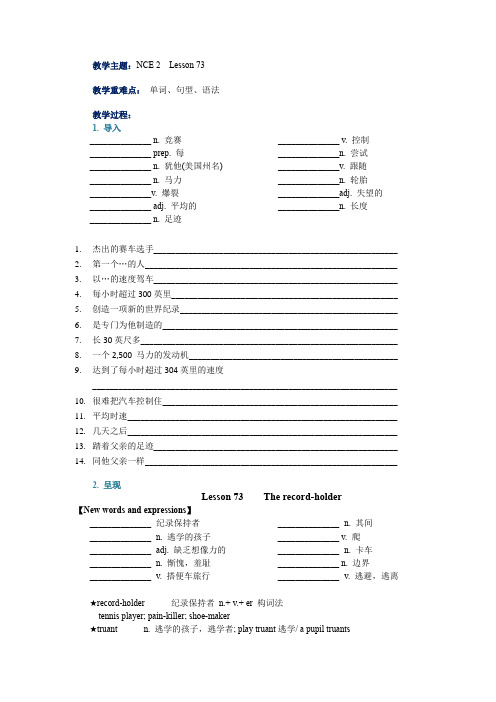
教学主题:NCE 2 Lesson 73教学重难点:单词、句型、语法教学过程:1. 导入______________ n. 竞赛______________ prep. 每______________ n. 犹他(美国州名) ______________ n. 马力______________v. 爆裂______________ adj. 平均的______________ n. 足迹______________ v. 控制______________n. 尝试______________v. 跟随______________n. 轮胎______________adj. 失望的______________n. 长度1.杰出的赛车选手________________________________________________________2.第一个…的人__________________________________________________________3.以…的速度驾车________________________________________________________4.每小时超过300英里____________________________________________________5.创造一项新的世界纪录__________________________________________________6.是专门为他制造的______________________________________________________7.长30英尺多___________________________________________________________8.一个2,500 马力的发动机________________________________________________9.达到了每小时超过304英里的速度______________________________________________________________________10.很难把汽车控制住______________________________________________________11.平均时速______________________________________________________________12.几天之后______________________________________________________________13.踏着父亲的足迹________________________________________________________14.同他父亲一样__________________________________________________________2. 呈现Lesson 73 The record-holder【New words and expressions】______________纪录保持者______________ n. 逃学的孩子______________ a dj. 缺乏想像力的______________ n. 惭愧,羞耻______________v. 搭便车旅行______________ n. 其间______________ v. 爬______________ n. 卡车______________ n. 边界______________ v. 逃避,逃离★record-holder 纪录保持者n.+ v.+ er 构词法tennis player; pain-killer; shoe-maker★truant n. 逃学的孩子,逃学者; play truant逃学/ a pupil truantsthe boy who played truant 逃学的孩子;evade school 逃避上学★unimaginative adj. 缺乏想象力的imagine v. 想象,设想;imaginative adj. 有想象力的: Painters should be imaginative.imagination n. 想象力-tive 一般是形容词的后缀;-tion 一般是名词的后缀★shame n. 惭愧,羞; What a shame! 真可耻!/ Shame on you! 替你感到可耻!He put me to shame. 他让我自惭形秽。
新概念英语NCE2_Lesson73(共48页)课件

escape强调“脱离或避开即将来临或近在眼前的伤害es、ca危pe险d、ea灾th祸
等事物”,常作借喻用
脱离死亡
1、She braked suddenly and _______ an accident.
A. escape
B. avoid
C. truant
D. evade
2、He ______ answering my questions.
他把旅途中发生的每件事都记录下来了。
6、Her speech was recorded on a tape.
她的演讲录在录音带上。
7、My voice doesn’t record well.
我的声音录下来不好听。
truant n. 逃学的孩子
play truant 逃学(英) truant = a child who played truant
Lesson 73 The record-holder
Who is this man?
He is a record-holder.
Usain Bolt
Robles
【Listening comprehension】
1、 Why did the boy become a record-holder? 2、 Did the boy go where he wanted to? 3、 Which country did the boy come from?
汤姆在学校成绩良好。
3、He broke the record for the one-hundred meter dash.
他打破了百米赛跑记录。
4、The project was completed in record time.
授课讲义新概念2册73-74
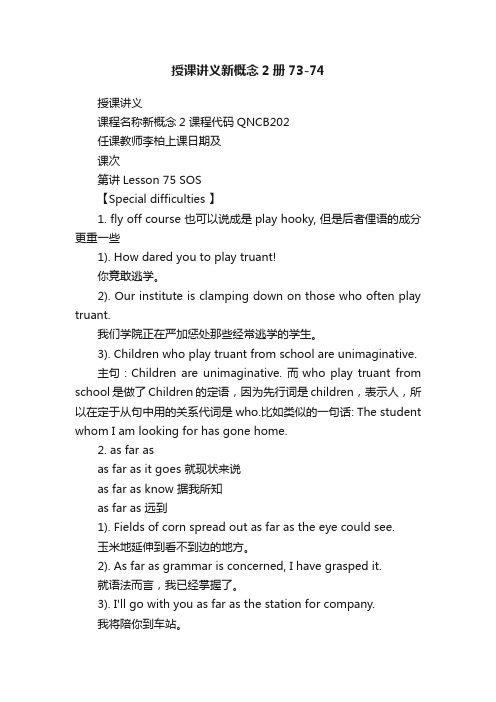
授课讲义新概念2册73-74授课讲义课程名称新概念2 课程代码QNCB202任课教师李柏上课日期及课次第讲Lesson 75 SOS【Special difficulties 】1. fly off course 也可以说成是play hooky, 但是后者俚语的成分更重一些1). How dared you to play truant!你竟敢逃学。
2). Our institute is clamping down on those who often play truant.我们学院正在严加惩处那些经常逃学的学生。
3). Children who play truant from school are unimaginative.主句:Children are unimaginative. 而who play truant from school是做了Children的定语,因为先行词是children,表示人,所以在定于从句中用的关系代词是who.比如类似的一句话: The student whom I am looking for has gone home.2. as far asas far as it goes 就现状来说as far as know 据我所知as far as 远到1). Fields of corn spread out as far as the eye could see.玉米地延伸到看不到边的地方。
2). As far as grammar is concerned, I have grasped it.就语法而言,我已经掌握了。
3). I'll go with you as far as the station for company.我将陪你到车站。
4). I'll go with him as far as the bus stop.我陪他到公共汽车站。
新概念英语第二册学案lesson 73
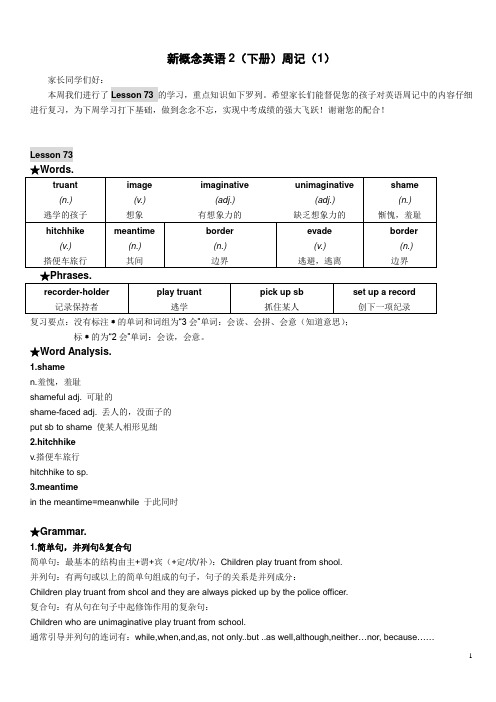
新概念英语2(下册)周记(1)家长同学们好:本周我们进行了Lesson 73 的学习,重点知识如下罗列。
希望家长们能督促您的孩子对英语周记中的内容仔细进行复习,为下周学习打下基础,做到念念不忘,实现中考成绩的强大飞跃!谢谢您的配合!Lesson 73复习要点:没有标注﹡的单词和词组为“3会”单词:会读、会拼、会意(知道意思);标﹡的为“2会”单词:会读,会意。
★Word Analysis.1.shamen.羞愧,羞耻shameful adj. 可耻的shame-faced adj. 丢人的,没面子的put sb to shame 使某人相形见绌2.hitchhikev.搭便车旅行hitchhike to sp.3.meantimein the meantime=meanwhile 于此同时★Grammar.1.简单句,并列句&复合句简单句:最基本的结构由主+谓+宾(+定/状/补):Children play truant from shool.并列句:有两句或以上的简单句组成的句子,句子的关系是并列成分:Children play truant from shcol and they are always picked up by the police officer.复合句:有从句在句子中起修饰作用的复杂句:Children who are unimaginative play truant from school.通常引导并列句的连词有:while,when,and,as, not only..but ..as well,although,neither…nor, because……通常我们所谓的复合句中通常包含一些从句,如定语从句就是复合句中的典型Ex.They have all been put to shame by a boy who, while playing truant, travelled 1,600 miles.★Topic for discussion.1.Describe and adventure that you or someone you know has had while traveling.2.What would you do if you played truant from school?3.What are the advantages/disadvantages of”hitchhiking”as a method of traveling?★Homework.1. 听录音,跟读课文每天10分钟,并背诵。
- 1、下载文档前请自行甄别文档内容的完整性,平台不提供额外的编辑、内容补充、找答案等附加服务。
- 2、"仅部分预览"的文档,不可在线预览部分如存在完整性等问题,可反馈申请退款(可完整预览的文档不适用该条件!)。
- 3、如文档侵犯您的权益,请联系客服反馈,我们会尽快为您处理(人工客服工作时间:9:00-18:30)。
Lesson 73 The record-holder一、教学重点1、复习书信写作二、教学步骤1、引入话题(详见右框)。
2’2、听一遍音频,掌握大意。
5’① Who put the children playing truant from school to shame?② Where did he go?③ Where was he picked up by a policeman?3、生词解读,纠正发音。
10’4、提出问题:What does the record actually mean in the text?看一遍视频,解答问题。
3’5、精讲课文,板书和笔记(详见下文)。
20’【第二节课】 1、做345页的两道选择理解题。
5’ 2、朗读课文。
10’ 3、复习句型(详见下文)。
10’4、做344页关于句型的练习。
15’5、绕口令。
10’【第三节课】1、讲解344页的难点。
10’2、听写单词,记忆法指点。
10’3、听英文歌曲。
8’4、看图背课文比赛。
20’5、总结本课重点,让学生标注(详见上文)。
1’6、布置作业:摘要写作,345页的选择题,背课文和单词。
1’三、单词讲解1. record-holder 记录保持者record-breaker 破记录者n.+ v.+ er 构词法tennis player 网球选手football player2. truant n. 逃学的孩子,逃学者The three boys who are fishing over there are truants and ought to be sent back to school. play truant 逃学(英)play hooky 逃学(美)evade school 逃学be absent from class on purpose 逃学3. unimaginative adj. 缺乏想象力的imagine v. 想象,设想imaginative adj. 有想象力的imagination n. 想象力-tive 一般是形容词的后缀;active, attractive-tion 一般是名词后缀description, collectionimaginative/imaginary/imaginable1. imaginative 充满想象力的an imaginative boy2. imaginary假想的an imaginary enemy3. imaginable能够想象出的(常作后置定语)This is the worst result imaginable.4. evade ①vt.(巧妙地)逃脱,躲开She evaded a blow from the man and then called out for help.②vt. 回避,逃避(尤指不当地)evade doing sth. 逃避做……He evaded joining the army.avoid v. 逃避,逃离,避免avoid 指通过一种合理的,正当的手段来避免做某事;evade 指通过欺骗的手段来避免做某事。
tax avoidance 避税tax evasion 逃税5. shame n. 惭愧,羞耻What a shame! 真可耻!Shame on you! 替你感到可耻!shameful adj. 令人羞愧的ashamed adj. 感到羞愧的put sb. to shame 让某人感到羞愧,使。
蒙羞You put me to shame. (你比我好的意思)= I am put to shame by you.6. meantime n.其时, 其间in the meantime 其间meanwhile 同时,其间I continued working, meanwhile, he went out shopping.meantime, meanwhile都可用作名词或副词。
表示“其间”、“与此同时”,以下四种表达均可以且可互换:meantime, meanwhile, in the meantime, in the meanwhile。
He was in London for a week, and meantime [meanwhile] she went on with the work.He was in London for a week, and in the meantime [in the mean-while] she went on with the work. 但在现代英语中用得较多的是in the meantime 和meanwhile。
I will call you Sunday, but in the meantime say nothing. 我The train won’t leave for an hour. Meanwhile we can have lunch.7. lorry n.运货汽车, 卡车(truck)8. hitchhike v. 搭便车旅行hitchhiker n. 搭便车的人hitchhike = take a lift 搭便车Last year, he hitchhiked to Tibet.9. border n.边界The Himalayas is the border of many countries.love the trees that stand on the northern border.四、课文精讲1、A quiet day's fishing, or eight hours in a cinema seeing the same film over and over again, is usually as far as they get.他们通常能够做到的,至多也就是安静地钓上一天鱼,或者在电影院里坐上八个小时,一遍又一遍地看同一部电影。
动词ing前面如果出现定语,若是名词,则采用名词所有格或名词短语本身。
Three hours(') listening to the teacher is tiring.Three hours in the room listening to the teacher is tiring.over and over again = again and again 一次又一次,一再地,as far as +从句最大程度……,到……程度,就……而言As far as I know, his operations are successful.This is as far as I can do for you.2、They have all been put to shame by a boy who, while (he was) playing truant, travelled 1,600 miles.而有一个小男孩,他在逃学期间旅行了1600英里,从而使上述所有逃学的孩子相形见绌。
while 引导时间状语从句,省略了主语和be 动词put…to shame 使……蒙羞,使……相形见绌What he has done put his parents to shame.He saved the child at the risk of his own life and put all those who looked on to shame.3、He hitchhiked to Dover and, towards evening, went into a boat to find somewhere to sleep.他搭便车到了多佛,天快黑时钻进了一条船,想找个地方睡觉。
hitchhike to…搭便车去……He plans to hitchhike to Tibet.Dover n. 多佛(英国著名的港口)towards evening 快到晚上somewhere to sleep 可以睡觉的地方(不定式做后置定语)I have something to tell you.He has lots of homework to do.4、When he woke up next morning, he discovered that the boat had, in the meantime, travelled to Calais.第二天早上他醒来时,发现船在这段时间已经到了加来。
5. No one noticed the boy as he crept off.当男孩从船里爬出来时,谁也没有发现他。
creep off = creep awaycreep crept crept creeping①vi. 爬行,匍匐,(像爬行似地)慢慢前进The old car crept along the country road.②vi. 悄悄地/蹑手蹑脚地走;渐渐产生/出现We crept upstairs so as not to wake Grandpa.He noticed that age had crept on him.6. From there, he hitchhiked to Paris in a lorry.The driver gave him a few biscuits and a cup of coffee and left him just outside the city.从那里他又搭上了卡车到了巴黎。
司机给了他几块饼干和一杯咖啡,就把他丢在了城外。
leave …+地点把。
丢/落在。
地方I left my homework at home.7. The next car the boy stopped did not take him into the centre of Paris as he hoped it would, but to Perpignan on the French-Spanish border.男孩截住的下一辆车,没有像他希望的那样把他带到巴黎市中心,而是把他带到了法国和西班牙边界上的佩皮尼昂。
take …into 带到…not…but…不是……而是……as sb. hoped 正如某人所希望的The driver took him into the city as he hoped.Don't ask what the country do for you, but ask what you do for the country.8. There he was picked up by a policeman and sent back to England by the local authorities.pick up 逮捕,拘捕After the accident, he was picked up by the police.9. He has surely set up a record for the thousands of children who dream of evading school.他无疑为成千上万梦想逃避上学的孩子们创造了一项纪录。
